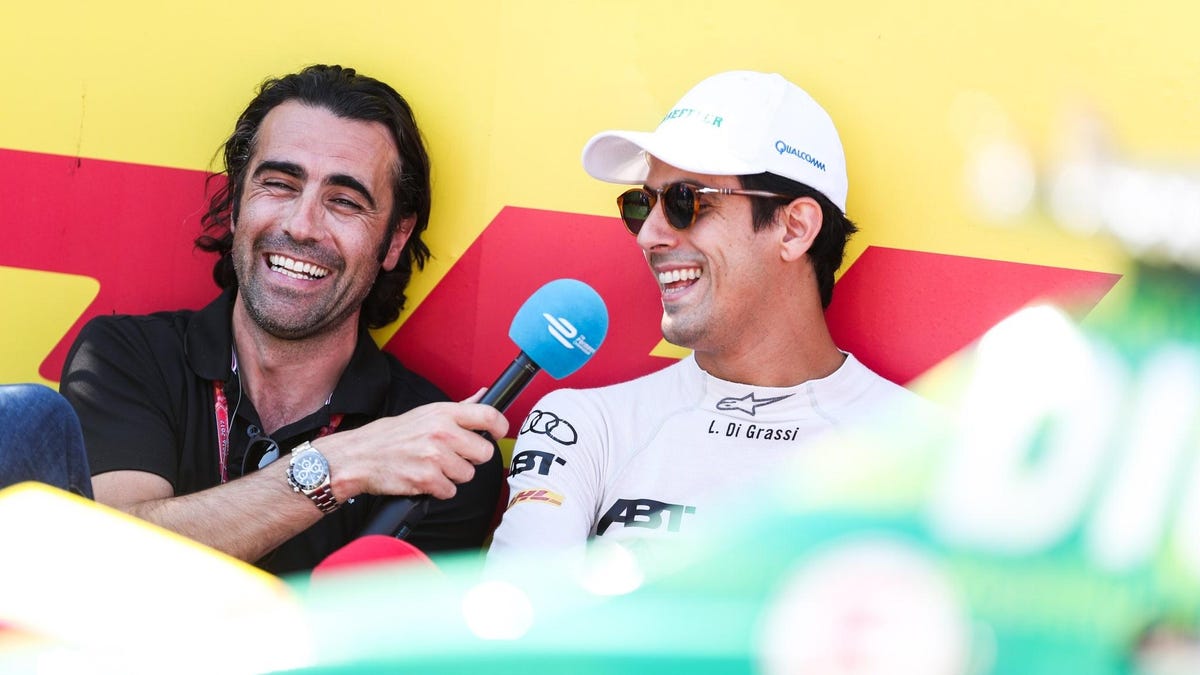'We're Controlling the Narrative.' Dario Franchitti on the Road from Racer to Formula E Commentator

Dario Franchitti interviews Lucas di Grassi ahead of the 2017 Montreal ePrix.Photo: Malcolm Griffiths/LAT/Formula E
When an accident at the 2013 Grand Prix of Houston unceremoniously ended his legendary IndyCar career, Dario Franchitti left behind the helmet and picked up the tool of his new trade: a microphone.
“Interviews are very different [than commentary] because there’s a finite time with them, and you’re not controlling it,” Franchitti said when asked about what makes commentary so distinct from the other media-facing activities he’d completed as a driver.
“Here, you’re creating the story. We’re controlling the narrative.”
I had a chance to speak with Franchitti ahead of last weekend’s New York City E-Prix in Red Hook, Brooklyn, and while my IndyCar-loving heart is still yearning for a lengthy retrospective chat about Franchitti’s success in American open-wheel racing, I was privy to some fantastic insights about what it takes to transition from the cockpit to the commentary booth — and I was surprised to learn he’d had Formula E on his radar for some time.
“Ali Russell was one of the founding members of Formula E, and we talked 10 years ago about me driving [in the series],” Franchitti admitted. As a four-time IndyCar champion and three-time Indy 500 winner, his presence would have lent significant credence to an as-yet-untested series looking to forge a path in the electric world. “But then when I had my accident and retired, I got a call saying, ‘Would you consider commentary instead?’ And I thought it would be interesting, since I was exploring what to do next with my life.”
So, Franchitti signed up alongside co-commentator Jack Nicholls, and together, the duo were tasked with a frankly extraordinary task: Writing the narrative of a brand-new series with exalted electric ambitions and an entirely new format.
“We literally sat in China, wondering if the cars were going to go off the line,” Franchitti recalled from the series’ first E-Prix in Beijing. “It’s a lot different than what we see today, you know? For a lot of people then, it was considered a joke.
“But you could see attitudes changing. Drivers, teams, fans. You could see them go from ‘I’m not getting involved in that’ to ‘Oh, hey, hang on, let’s do this.’”
That transition has come, in part, from the voices that have helped direct Formula E’s public presentation. The camaraderie between Franchitti and Nicholls — the latter of whom recently introduced the former as “the man who finished 33rd at the 2008 Daytona 500″ on a live broadcast — and between the commentators and drivers has helped provide a necessary sense of direction to a profession that Franchitti describes as extremely subjective.
“In racing, you get a results sheet. You know how well you’ve done,” he said. “Here, it’s like, ‘Was that good? Did I do a good job?’ And Formula E races happen so quickly, so there’s no time to make a long point.”
It’s been a learning experience for the former racer. In the beginning, Franchitti admitted to showing up at races with a minimal amount of prep because he — like many of us — saw commentary as just chatting about a race.
“It’s easy to look at a situation and have an opinion on it,” Franchitti said, “but when you go and talk to the driver and the team, you understand.
“That’s something I think I’m a bit more sensitive to because I’ve been the driver when people say, ‘Oh, he’s crap’because of the way I’ve been presented, but there’s more to it. [As a commentator] I try to call it as I see it, but I also want the full backstory.”
That commitment to storytelling has created one a fan-favorite broadcast for the dedicated fans tuning in to watch Formula E. With a unique blend of personalities and approaches to broadcasting from each person on the FE team, Franchitti finds it best to measure his success in simple terms.
“Sometimes, you walk away knowing you’ve done a really good broadcast. But mostly, it’s just knowing you’ve helped people enjoy and understand the race,” Franchitti said. “The first thing I thought about when I was doing this was that I wanted it to just be two mates sitting, watching a race. It’s a World Championship, but it doesn’t need to be serious. But when you get that balance, it’s just fantastic.”



